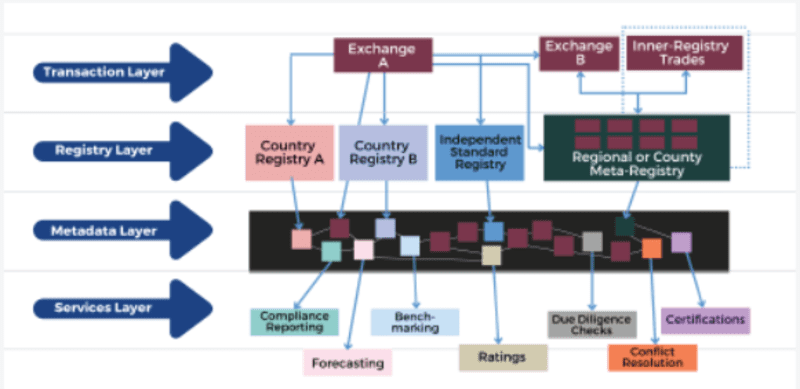The ‘Blockchain for Climate Action and the Governance Challenge’ Report is a product of the International Association for Trusted Blockchain Applications (INATBA) and the Climate Ledger Initiative (CLI). These two organisations highlight practical governance challenges that confront blockchain-based climate action.
Blockchain works without a central authority. But this does not mean there should exist an absence of governance. For this Report ‘governance’ is the allocation of power, risks and responsibilities. It is, therefore, core to blockchain-based climate actions. This means governance challenges require carefully addressing – in order to build trust and confidence when using blockchain to advance climate initiatives.
Governance challenges
The Report views governance challenges as existing along three different ‘levels’:
- international
- national
- blockchain.
The focus of the first two is principally about compliance with existing national and international laws. In contrast, the last demands the active definition of rules as well as the design of systems to enforce these rules (preferably in an automated way).
Make sure blockchain projects comply with international rules on climate change
The key questions here (in the report) are:
- does a project fit one of the following: measurement, reporting, verification (MRV), market mechanisms, climate finance flows or clean energy?
- what role do non-party stakeholders have in the implementation of the Paris Agreement?
Is governance on and off your blockchain is well defined?
The key questions here are:
- what is the right project governance and management?
- what is the right consensus mechanism, particularly considering performance and resource consumption?
- how does your blockchain interact with the outside world, including off-chain data and other blockchains?
Does each blockchain project for climate action comply with national laws?
Here the key questions are:
- is each (or any) case so disruptive that national laws do not yet well suit?
- what jurisdiction applies in case of conflicts/what national laws with global impacts need consideration?
- what legal status does an entry on a relevant blockchain have?
- is there clarity about the validity of electronic signatures, blockchain-based?
- assets and registries and data protection?
- what is the legal status of smart contract?
Enterprise Times: what does this mean
This Report’s aim is to provide an overview of relevant governance challenges facing blockchain-based climate action. As such the Report ranges over technical design (of climate-related blockchain systems to compliance with legal regulation). Inevitably the Report cannot be exhaustive: but it is, nevertheless, of value for its consideration of issues, like governance, which too often do not rise to the surface (or rise too late to be able to do much that is meaningful). At the same time, the Report shows there are possibilities to balance energy consumption with node scalability, throughput and latency – depending on the project.
What the Report makes clear is that governance challenges require careful consideration in order to build trust and create confidence when climate action is involved. Three use cases – including a World Bank Warehouse one, shown below) provide deeper insights into how the governance issues are addressable in practice.

At the international level, the Report argues that blockchain fits well with the decentralized structure of the Paris Agreement. The UN Climate Change Secretariat has recognised the role that blockchains could play in the Agreement’s implementation and it specifically identifies the implementation of provisions related to MRV, decentralised market mechanisms and enhancing finance and clean energy as suitable for blockchain-based projects.
In contrast, the governance challenge at the blockchain level, while simple sounding, needs assessment to establish if a blockchain solution offers is the right technology for a given project (or if a centralised database might suffice). Equally, as the Report says: “the active definition of on-chain governance plays a significant role in determining who maintains power and responsibilities.
“This begins with the decision of having a private or public permissioned or permissionless blockchain, the choice of consensus mechanism and how the blockchain interacts with other blockchains and more broadly the outside world. The choice of the proper participation mode and governance structure strictly depends on the use-case characteristics. In the context of climate action, the energy consumption of consensus mechanism is of particular interest.“
